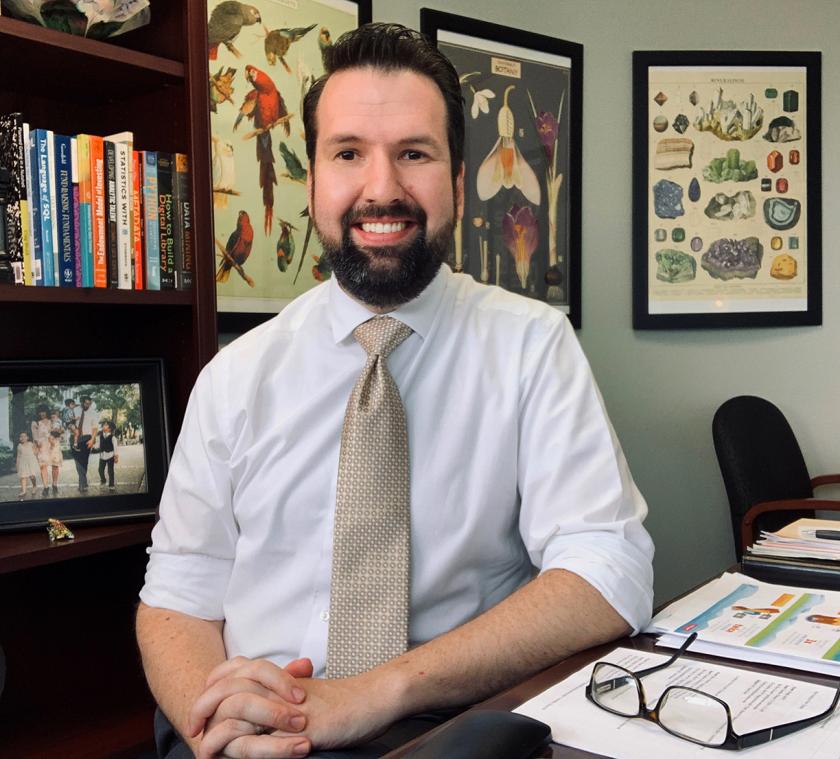
Where do you work, and what is your role?
I work for the University of Texas at Austin in the University Development Office (UDO). UDO is the fundraising arm of the university and oversees philanthropic giving from alumni, friends, foundations, and corporations totaling several hundred million dollars every year. As the senior executive director for advancement data operations and strategy, I oversee over twenty individuals across three teams responsible for gift and data processing, data quality, business intelligence, and predictive analytics.
What did you do previously?
Like many individuals I had the pleasure of meeting during my time as a student at the iSchool, I have taken a nonlinear path to my current role. I actually started graduate school working toward a PhD in French literature. Through a long series of twists and turns, I graduated from the iSchool with an MS/LIS and accepted a job as a data analyst in the Office of the Vice Chancellor for Institutional Advancement at the University of Illinois. I was recruited to Texas in 2017 to take over UDO's Reporting, Analytics, and Data (RAD) team and to launch an analytics program, from where I was most recently promoted to my current role.
What do you like best about your job?
One of the best things about working in a development office is being able to work with highly intelligent, passionate, and genuine people. We are mission driven and believe in the work that we do, which I find brings out the best of people in the day to day. I also enjoy building solutions and improving business processes; each day is a new puzzle with a new answer!
Why did you decide to pursue a degree in LIS?
I was pursuing a PhD in French literature at NYU when the Great Recession hit. Suddenly romance language programs were being cut across the country, and hiring freezes seemed to be universal. Seeing the writing on the wall, I took a year off and decided to weigh my options. As I considered taking the LSAT or applying to MBA programs, I remembered my very first orientation meeting with the French subject-matter librarian at the NYU Bobst Library. This started the thought process that would eventually see me apply to the iSchool. I originally thought I would pursue a specialization in special collections or archives, but I was introduced to data curation, and the rest is history. (Though I did still complete a special collections certification and spend time transcribing Proust's letters in the Kolb-Proust Archive.)
How did the iSchool help you get to where you are today?
There are many institutions and people to whom I owe a great deal for my current success, and the iSchool ranks highly among them. The courses in databases, programming, metadata, UI/UX, and digital libraries all provided the technical foundation upon which my career has been built. The professors and mentors I was privileged to work with during my time as a student really brought out the best in me and allowed me to at first hope, and then believe, that a humanities major could transition into STEM.
I have been privileged over the years since graduating to have continued my affiliation with the iSchool as an online instructor. The School attracts talented students who have continually pushed me to keep my own skillset sharp and who have been a joy to teach!
What advice would you like to share with iSchool students?
I would quote to them what Professor [Allen] Renear once told me after my new student orientation, advice that changed my course of study and shaped my career: "Take the most challenging classes we have to offer. Take courses that cover subjects you wouldn’t be able to learn on your own at night. If you do that and work hard, your time at the School will not have been wasted."
What do you enjoy doing in your spare time?
I enjoy spending time with my four kids playing riotous games of "Duck, Duck, Goose" with the littlest or playing Xbox with my oldest. When I find the time, I enjoy oil painting, and I still occasionally tuck into a good book—in French, of course!